Since our financial epiphany, we have tracked our expenses using a self-made excel sheet. Within this excel spreadsheet, we have established different categories like grocery, household items, eating out, hydro, car fuel, etc to allow for some quick analysis when needed. We have been reviewing our expenses semi-annually to see which areas we can improve on.
One of the key expense categories that we keep a close eye on is our grocery spending. With two growing kids, I expect that our grocery spending will increase over the next few years. Baby T2.0 started eating solid foods in 2H of 2016. Today she often eats as much as I can. Baby T1.0 eats quite a bit too. Occasionally both kids would eat more than I do! So, we have already seen the grocery budgetary effect of having two growing kids.
With that in mind, I was super inspired after reading Justin at Root of Good’s article on price comparison of low cost grocery stores. He concluded that Costco costs more, and Walmart is the best. After reading his article, I began to wonder, what would happen if I were to do a similar study of Canadian grocery store comparison in our area? Would we find a different result? Would we find that Vancouverites pay more for food? What would be the cheapest grocery store in Canada?
I decided to do the experiment. I visited five grocery stores near me in the metro Vancouver area to check prices on 18 food items that we regularly purchase. The grocery stores I picked were Walmart, Safeway, Costco, Save On Foods, and Superstore.
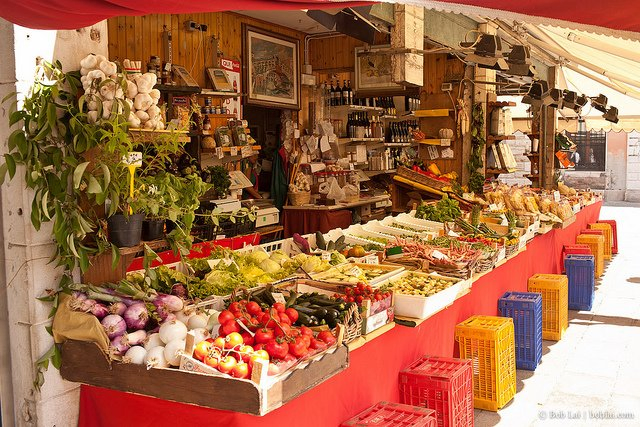
I had some assumptions going into the experiment. I assumed that Safeway would be the most expensive grocery store in Canada with Save On Foods slightly behind in food prices. I assumed that both Walmart and Superstore would be the cheapest grocery store in Canada, with Costco falling in the middle of the cost spectrum.
The Raw Numbers
Here are the raw numbers with the lowest cost for each item highlighted in green:
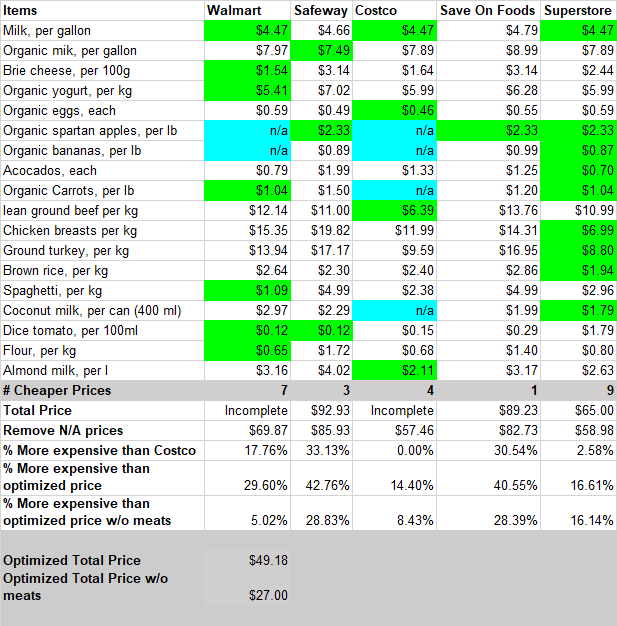
And an actual visual table:
| Items | Walmart | Safeway | Costco | Save On Foods | Superstore |
|---|---|---|---|---|---|
| Milk, per gallon | $4.47 | $4.66 | $4.47 | $4.79 | $4.47 |
| Organic milk, per gallon | $7.97 | $7.49 | $7.89 | $8.99 | $7.89 |
| Brice cheese, per 100g | $1.54 | $3.14 | $1.64 | $3.14 | $2.44 |
| Organic yogurt, per kg | $5.41 | $7.02 | $5.99 | $6.28 | $5.99 |
| Organic eggs, each | $.059 | $0.49 | $0.46 | $0.55 | $0.59 |
| Organic spartan apples, per lb | N/A | $2.33 | N/A | $2.33 | $2.33 |
| Organic bananas, per lb | N/A | $0.89 | N/A | $0.99 | $0.87 |
| Avocados, each | $0.79 | $1.99 | $1.33 | $1.25 | $0.70 |
| Organic carrots, per lb | $1.04 | $1.50 | N/A | $1.20 | $1.04 |
| Lean ground beef, per kg | $12.14 | $11.00 | $6.39 | $13.76 | $10.99 |
| Chicken breast per kg | $15.35 | $19.82 | $11.99 | $14.31 | $6.99 |
| Ground turkey, per kg | $13.94 | $17.17 | $9.59 | $16.95 | $8.80 |
| Brown rice, per kg | $2.64 | $2.30 | $2.40 | $2.86 | $1.94 |
| Spaghetti, per kg | $1.09 | $4.99 | $2.38 | $4.99 | $2.96 |
| Coconut milk, per can (400 ml) | $2.97 | $2.99 | N/A | $1.99 | $1.79 |
| Diced tomato, per 100 ml | $0.12 | $0.12 | $.015 | $0.29 | $1.79 |
| Flour, per kg | $0.65 | $1.72 | $0.68 | $1.40 | $0.80 |
| Almond milk, per l | $3.16 | $4.02 | $2.11 | $3.17 | $2.63 |
| # Cheaper Prices | 7 | 3 | 4 | 1 | 9 |
| Total Price | Incomplete | $92.93 | Incomplete | $89.23 | $65 |
| Remove N/A prices | $69.87 | $85.93 | $57.46 | $82.73 | $58.98 |
| % More expensive than Costco | 17.76% | 33.13% | N/A | 30.54% | 2.58% |
| % More expensive than optimized price | 29.60% | 42.76% | 14.40% | 40.55% | 16.61% |
| % More expensive than optimized price w/o meats | 5.02% | 28.83% | 8.43% | 28.39% | 16.14% |
| Optimized Total Price | $49.18 | ||||
| Optimized Total Price w/o meats | $27 |
Note: We are a bit messed up here in Canada when it comes to food unit measurements. Technically we are supposed to the metric system, but prices for produce are typically displayed in dollar per pound, then gets converted to dollar per kg on the receipt (sometimes meats too). Hence for my usage of both $/lb and $/kg.
Results – Canadian grocery store comparison
My assumption was correct, Safeway and Save On Foods were clearly the “price leaders”. I was shocked at how much more expensive Safeway and Save On Foods were when compared to Walmart and Superstore. Safeway and Save on Foods are indeed the most expensive grocery stores in Canada from this Canadian grocery store comparison.
As expected, Walmart and Superstore led the way on having low priced items.
Costco didn’t sell any organic produce, so it was not possible to do an “apple to apple” comparison with the other stores. Costco was also the only store that didn’t sell canned coconut milk.
What surprised me is the fact that Costco had the cheapest overall price if we add up the prices of the 14 available items. Walmart was 17.76% more expensive than Costco, Safeway was 33.13% more expensive than Costco, Safe On Foods was 30.54% more expensive than Costco, and Superstore was 2.58% more expensive than Costco (looking at the “$ more expensive than Costco” row in the chart above). Despite this surprising result, I believe this was a bit misleading. This was probably a result of a huge price delta in meat items between Costco and the other stores. So when we added up everything, the overall Costco price was lower than the other stores.
Another thing to consider when shopping at Costco is that Costco is the only store in this experiment that comes with an annual membership fee. You must have a membership to enter Costco and you must show your membership when you purchase an item (you can get away without one, however, if you use a Costco gift card). So when calculating the true Costco price, we need to consider either the $60 Gold Star membership fee, or the $120 Executive membership fee. For us, we think the $120 Costco Executive membership is totally worth the extra $60 a year because we earn 2% when we shop at Costco.
If we pick the 14 lowest priced items from the 5 stores compared, the total price came out to be $49.18. When compared to the optimized price, Walmart was 29.60% more expensive, Safeway was 42.76% more expensive, Costco was 14.40% , Save On Foods was 40.55% more expensive, and Superstore was 16.61% more expensive.
As noted, the data might be a bit misleading due to the overall cheaper meat prices at Costco. If we take out meat prices, the optimized total price was $27. When comparing this optimized price, Walmart was 5.02% more expensive, Safeway was 28.83% more expensive, Costco was 8.43% more expensive, Save On Foods was 28.39% more expensive, and Superstore was 16.14% more expensive.
Based on the two optimized price results, I would conclude that Walmart is the best place to purchase grocery items, if you aren’t looking for organic food and meats. Superstore is the best place to purchase grocery items if you are looking for organic food and meats.
In other words, the cheapest Canadian grocery store are Walmart and Superstore depending on what kind of groceries you typically shop for.
A few notes on methodology
Unlike Justin did in his experiment, I did not pick the most reasonable items that many would buy. Rather, I focused on food items that our household would usually buy. Since late last year, we have been eating more organic food. Therefore, this resulted in picking organic produce, organic yogurt, organic eggs, and other organic items for this experiment. This may not reflect what other people may purchase, but I performed this experiment with our household in mind, so I picked items that we would usually buy.
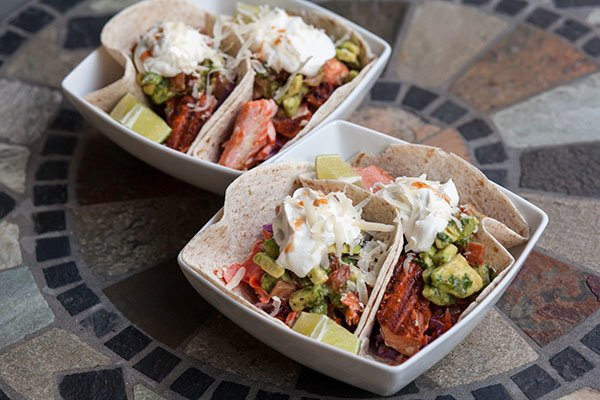
I also picked prices for the largest packaging and generic brand whenever possible to drive the unit price down. For example, most of the Costco items were Kirkland brand, most of the Superstore items were No Name brand (yes that’s actually a brand name!), and most of the Walmart items were Great Value brand. When store brands weren’t available, I made sure I compared items with the same brand.
Initially, I had 10 more items like organic celery, organic broccoli crown, organic whole chicken, crispbread on my price comparison list. However, not every store carried these items, which made the price comparison quite difficult. For example, Costco was the only store that carried canned organic diced tomato, and Save On Foods and Superstore were the only stores that carried dark rye flour. In the end, I decided to take these items out to make the price comparison analysis easier.
Another key point to mention is that the prices listed in the chart are all regular prices. When I did the experiment, some items were on sale in the different stores. So if we check out the weekly flyers, we could save even more money on many of these items.
How to get the cheapest groceries in Canada – Grocery Shopping Strategy
Considering that we want to optimize our grocery expense moving forward, I think this cost comparison will help us in reducing our overall grocery bill. You see, for the most part, we have been shopping at Costco and Save On Foods. This is because we are a one-car-household and the closet grocery store is Save On Foods. Mrs. T would walk to Save On Foods with the kids for grocery shopping and I would drive to the Costco nearby my work every month to purchase other bulk items.
Since both Superstore and Walmart are about a 30-minute walk from our house, it is probably unreasonable to ask Mrs. T to shop there on a regular basis. This means moving forward, I need to do more grocery shopping.
If we look at our household food consumption trend, we consume a lot of eggs and cheese (we go through minimum 2 eggs each day). For meats, we usually eat chicken, ground turkey, and fish rather than ground beef. Overall, we have been eating less and less meat in our day-to-day meals.
Looking at the price comparison chart above, here’s the grocery shopping strategy we should deploy moving forward:
Do:
- Plan ahead. Develop a grocery shopping plan with Mrs. T so we can split the shopping duty.
- For dairy, eggs, and possibly bulk items like spaghetti, flour, canned diced tomatoes buy them from either Costco or Walmart.
- For organic produce and meats, buy them from Superstore. By joining the PC Insiders program (well worth the $99 annual fee), we have managed to earn extra PC Optimum points on organic products and then redeem PC Optimum points to reduce our grocery bills even more.
- If Mrs. T needs something on the day of, and I can’t buy from Costco/Superstore, it’s OK to buy from Save On Foods.
- Buy stuff that’s on sale that we normally buy.
- Plan our meals around items that are on sale.
- Buy bulk to save money. We can always repackage meats into smaller portions and put them in our chest freezer.
- Save the price comparison on Google Drive so we can check the prices if we see something on sale at a store.
- Consider the amount of time it takes to shop. Time = money.
Don’t:
- Don’t just blindly buy things from Costco.
- Drive long distances just to save a few dollars. It makes no sense to buy from all 5 stores just to optimize grocery spending.
Grocery spending trend
Below are our household average grocery spending since 2011. As you can see, our grocery monthly spending has been increasing the last couple of years. I expect this number to increase in 2017 again due us eating more organic food and Baby T1.0 and Baby T2.0 eating even more food. (We spent a total of $44,138.77 in 2016)
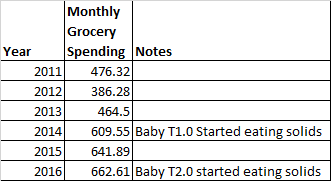
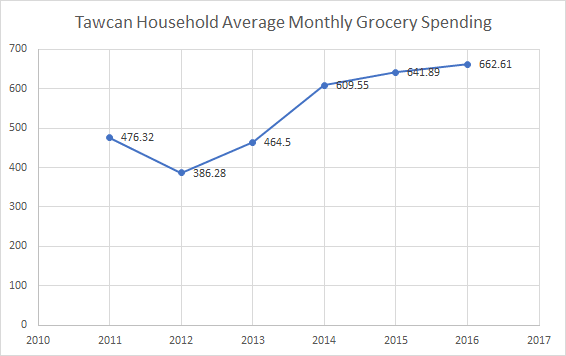
Having said that, if we focus on shopping smarter, I am optimistic that we can reduce our monthly grocery spending. We probably won’t be able to hit below $500 per month (~$388 USD), but I think below $600 per month (~$465 USD) is quite reasonable and definitely possible.
Just for fun comparison
What happens if we compare our optimized prices with Justin’s? Do food cost more in Vancouver or do food cost more in Raleigh?
Since Justin and I performed our experiment with different items, it was hard to do a direct comparison. To make this realistic, I decided to compare only common items on our list.
My assumption is that food items are much cheaper in Raleigh, NC than Vancouver, Canada.
Below are the comparison numbers:
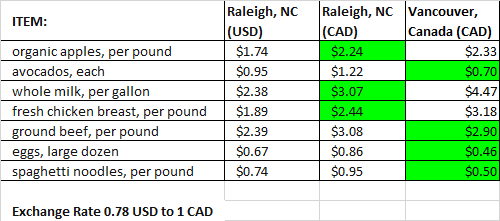
Wow, I am shocked with the comparison result!
Turns out, many food items are much cheaper in Vancouver than Raleigh. Obviously the poor CAD to USD exchange rate made the Raleigh food items more expensive arbitrary. If we consider a 1:1 exchange rate, you can see that Raleigh would come out ahead.
Having been to Raleigh, NC several times, I can say with certainly that the cost of living in Raleigh is much cheaper than Vancouver. Houses are much cheaper in Raleigh than Vancouver, and taxes are lower in Raleigh too. I think Justin and his family will be just fine paying slightly higher prices on food. 😉
Should we continue shop at Costco?
According to the results of my experiment, it still makes sense to shop at Costco. Costco sells a lot more than just grocery items. Costco has great deals on many non-perishable items like toilet paper, dish detergent, baby diapers, etc. Sometimes it just makes sense to buy items in bulk to save as much money as possible.
One of my biggest frustrations of late with Costco is how long it takes to find a parking spot. The other weekend I took Baby T1.0 and Baby T2.0 to Costco by myself. It took me close to 20 minutes to find a parking spot!!! Once I got inside, the Costco warehouse was super packed. What was even more frustrating was the fact that so many people were walking with their shopping carts around like snails and we couldn’t pass them at all. It was a shopping cart traffic jam! (Maybe I should revise my Costco shopping survival guide?)
However, Baby T1.0 and Baby T2.0 always enjoy going to Costco to try out the different free samples. They also love all the attentions they get from the Costco associates and cashiers. Going to Costco with their daddy on the weekends have turned into somewhat of a family tradition as of late.
I think we will continue shopping at Costco for non-perishable, dairy, eggs, and other bulk items. Somehow, I will need to find a not-so-busy time slot to go to Costco, grab all the items I need quickly, and get out.
Seeing how insanely busy it is at every local Costco warehouse and people’s general love for shopping at Costco, I am really glad that we are Costco share owners. Hopefully Costco will continue making massive amount of profits and share the profits with their share owners in the forms of increasing dividend payments and special dividend payments.
Conclusion
Superstore and Walmart are the cheapest Canadian grocery stores in our area. Costco falls in the middle of the price spectrum. Save On Foods and Safeway are the most expensive Canadian grocery stores, but that isn’t a surprise, since neither of them are considered as “low cost” grocery stores.
While it was fun to compare prices and finding out which store has the cheapest items, we need to remember the time it would take to walk/drive to the different stores. With two little kids, it simply makes no sense to go to 5 different stores just to save a few dollars here and there. It is way more efficient to buy groceries from a couple of stores.
One final thing to consider is that items go on sale in all of these stores. When this happens, we need to take advantage of the sale price and stock up if possible.
Update: Check out the updated version of this grocery stores comparison between Costco, Superstore, and Walmart.
Dear readers, where do you shop for grocery? How much are you spending per month on grocery?


Its 2023, we all wish food was this cheap, from anywhere!
Thanks for this comparison. It’s relevant for me because I live in the Lower Mainland. I do not shop at Costco because the sizes and the hassles of store location and parking don’t make sense for me.
I’ve found the exact same thing anecdotally that Superstore is much cheaper than SaveOn. I am teaching my elementary school children about money and I joke that Safeway is the giant convenience store down the street.
For diapers I found that Teddy’s Choice from Superstore were the best price and value. Great blog! Keep up the good work.
Yea Safeway is so expensive compared to other grocery stores.
Luckily we use clothes diapers, only disposables at night and when we are out. So don’t need to purchase tons of diapers.
Love the comparisons Bob. Aldi is definitely the cheapest here in Australia. We could do with a bit of price disruption from overseas competitors.
Mr DDU
I wish we have Aldi in Vancouver. Got really used to purchase things at Aldi when I was living in Germany years ago.
My question to everyone is who buys meats and non perishable goods when they are NOT on sale???? For me selecting what grocery store to shop at is dynamic, it all depends on who has the items I need on sale and bonus if they price match. Use the flipp app to easily see who has the good sales and when items that you consume on a regular basis go on sale buy lots!
I need to look into using Flipp more! Good tip!
I am trying to reduce my bill by $100 so that would be about $180/week (instead of the $280 we were spending). Once I remove personal care, household items and pet supplies , it is not as bad as it sounds! Costco is still a good deal for us for some items ( I tried the avocados everywhere else but the size and quality is just not the same 90% of the time) but have learned to check Flipp before I go shopping. As I said, so far Food Basics is the second place for me to go since I don’t want to be travelling from store to store all week end! Same at our house with the croissants…but haven’t been buying as many treats lately. I am set to meet my goal! (don’t think the kids quite like it)
Our Executive Costco membership is fully covered (and more) by the 2% cash back we get once a year. We are a family of five (all kids are older so just like adults) and our spending was around $1,200/month including household , personal care and pets. My goal is to reduce our bill by $100/week. I used Flip extensively for the first few weeks for comparison and tried a few stores (some I just didn’t like). The conversion for some of the produce was a real nightmare when trying to compare! So far Costco is still the best place for meat for us for the quality it offers. Milk is about the same everywhere these days. And I started shopping at Food Basics for produce and various other items in smaller quantities. I try to stick to two stores . And for some reason Shoppers Drug Mart has a real good deal on eggs on a regular basis (cheaper than anywhere else) so worth it if you need something else.
I feel $100/week would be really difficult nowadays with the inflation. $200/week is the new normal for me.
Costco is only good for big families. My family is also five. We did not go to Costco when we were a family of two. The package is so big food would go bad before we could finish. Now if I buy a box of croissants, sometimes the box emptied before I got a chance to eat one.
I’m thrilled to see another PF writer that’s a happy Costco shareholder. I’m still a huge fan, in Dallas the Walmarts and local Aldi are a tougher experience. We will go there once a month or so.
Our Safeway’s sales are awesome, but I feel like I’m being outright robbed when I buy something from there at regular price.
Remember your Costco membership does pay for itself at a certain spend level on the 2% rebate model.
We have the 2% Costco membership and we use our 2% rewards Mastercard when shopping at Costco. Essentially we’re getting 4% back whenever we shop at Costco. That saving adds up too. 🙂
As I only shop for one, my grocery (No Frills -> discount affiliate of Superstore) budget is $100/mth and I use my PC Mastercard. My rule of thumb for grocery shopping is that if I can make it, I don’t buy it ready-made. So I buy a lot of raw ingredients and make my own meals, soups, muffins, scones, desserts, etc. I also take my lunch to work everyday and eat dinner in every night.
Re: Costco, I just let my membership lapse 6 days ago. I was only going there for dog food and coffee. I didn’t enjoy going to Costco (too busy and felt like you are being herded like cattle through there), and the stress of shopping there just wasn’t worth it anymore. I found another retailer that sells dog food that my puppers loves and I stocked up on coffee so I have a little time before I need to find another coffee source.
I was initially sold on the idea that Costco was the cheaper option out there for a lot of things including grocery items… until I started shopping at Superstore (to use my PC Financial Mastercard)! I find Superstore beats Costco in almost every category, and I have to say the jury is still out on whether I will be renewing my Costco membership when the current year expires.
I think there’s a reason to shop at Costco as Costco does sell other things than grocery items. The trick is to find a couple stores that will give you the most optimal prices and time it takes to shop.
Looking at your screenshot of the spreadsheet, 6.99 $/kg for chicken breast at Superstore seems odd. Is it for bone-in chicken breast, if that’s the case, then the comparison is not apples to apples as Costco chicken breast is bonelsee . The boneless chicken breast typically goes anywhere between 10.99-14.00 $/kg in superstore, so the regular prices on that item are typically on par between Costco and Superstore, with Costco being much better quality wise.
$6.99/kg for chicken breast at Superstore was what I was able to find and it was boneless. I was shocked initially to see such a huge price difference with Costco. That wasn’t even the sale price (it was regular).
Very informative post. One thing missing from your detailed comparison is the quality of produce. In my experience, Walmart and Superstore produce can be atrocious and sometimes not worth the savings.
For example, I have stopped buying ground beef and chicken breast from Superstore as they have been pretty bad. The same with the fruits specially in the summer time, things like apples, nectarines, peaches, and cherries are much better in your local farmers market, so I think the premiums are justifiable in these cases.
And as all the other comments here, do sign up for PC points and PC Elite Mastercard. They are the best royalty points offered by any grocer.
Very true about quality of the items. We haven’t bought chicken breasts from Superstore so I can’t say what the quality is like. We’ve been happy with chicken breasts from Costco. Also agree that usually you get way better quality produce and fruits from local farmers market.
I agree. Costco’s meat is generally pretty good. I believe their internal food handling practices are one of the best in the industry. I can’t remember the last time i bought meat at superstore, but i tend to think its lower quality than choices or whole foods (albeit cheaper).
Can’t really compare Superstore to Choice and Whole Foods IMO. Different levels. 🙂
I enjoyed the comparisons to Raleigh but I have to wonder where in Vancouver you can get eggs for $0.46 per dozen!
Ahh good catch! The price should be per egg not per dozen! Oops.
LOL, I’ve been buying them for $0.40 per dozen at the neighborhood grocery store that’s starting to compete with Lidl, Aldi, and Walmart. I thought your costs were pretty low for a dozen eggs. 🙂
Damn $0.40 per dozen? Ok my number is per egg. Darn eggs are cheap down there.
yeah canada has supply chain management practices for eggs and dairy. which is why milk, eggs and cheese are always cheaper down south. But frankly i don’t feel bad paying higher slightly prices so that our farmers can actually make a living wage and not drown in debt like in the US (looking at you tyson foods)
I go to Costco and T&T every week. Costco has a very small range of choices so Costco alone cannot meet my grocery needs. Other than price, I feel Costco normally has higher quality products. Meat from Costco is better tasted than T&T. But again, not all kinds of meat I could buy at Costco. My kids like beef shanks which is not available at Costco.
I shop occasionally at Superstore. Where my kids practice soccer is just behind a Superstore. Superstore has the best tasting frozen chicken wings that is also cheap.
Agree it’s not worth it to shop many stores. Being a parent, time and energy is also very precious.
Love this. Though a similar comparison, we’re loyal Costco and Superstore shoppers so I wanted to share how we save so much more than we ever used to.
Costco: There is a website that has a very detailed (with photos) listing of all discounted items every Monday by region.
https://cocowest.ca
https://cocoeast.ca
Whether there is a sale flyer at the door (or on the app), you can use the list to plan out your shopping, as they catch the unadvertised “secret sale” items too. Look closely at the signs to see the unit price and expiry date (some are for only a week, some are two or more). Items may vary by store but so far it’s been bang on.
Also, Costco price matches if an item goes on sale after you’ve purchased it. Just take your receipt to Customer Service, no need to bring the items.
Superstore: The PC Points card and app refreshes special offers every Thursday. It starts out randomly but as you use the card, it learns what you buy most often and offers those specials regularly. You can swipe an item to save it for next week (3 items/week) or to never show if it’s not something you ever buy. Points add up fast and when paired with the PC World MasterCard, even faster. They have in store deals that aren’t on the app too so keep an eye out. My husband and I have a combined savings of almost $5,000 since the card came out.
Hi Penny,
We definitely check cocowest.ca regularly to see what’s on sale. I haven’t paid too much attention with PC Points card but will have to take a closer look to maximize the savings. Sounds like there are definitely things we can do to save some money on groceries moving forward.
WOW, this is a super detailed analysis, Tawcan! The spreadsheet nerd in me is loving it! Especially seeing how you proved “many food items are much cheaper in Vancouver than Raleigh.” Very eye-opening! Yay for the crappy CAD to US exchange rate?
I’m so impressed you guys are able to spend so little living in Vancouver. I remember going there in 2010 and my credit cards were getting quite the work out. Looks like I didn’t do a great job optimizing my expenses back then.
Thanks FIRECracker. The crappy CAD to US exchange rate is making food items to be much cheaper in Vancouver than Raleigh for sure. We are keeping our expenses in check but I think we can do some optimization.
Tawcan –
Love the experiment and something I have wanted to do for some time now. As always – every dollar counts! Nice article.
-Lanny
Thanks Lanny. Every dollar counts indeed!
One of our local blogs does an analysis like this for our area every year. They also find, sadly, that Walmart comes out on top. I can’t stand shopping at Walmart. The two biggest chains for us are Price Chopper and Hannaford, and they have their pros and cons, but the biggest difference is that PC has a discount card and Hannaford doesn’t. And with the discount card, they have good sales items every week, but that only serves to distract from the higher prices on other things, so Hannaford usually comes out cheaper than PC. I also prefer the predictability of the Hannaford prices, and it’s the closest grocery store to my house, so I do all my shopping there. This year we’ve been averaging $435/mo. on groceries.
Averaging $435 per month on groceries is pretty awesome. Having the predictability is pretty important too.
Great comparison post Tawcan! I did a similar study a few months back with our local bulk grocers — Costco and Cash & Carry. The findings were similar. Sometimes Costco was cheaper, but more often than not other stores would be.
Since that study, I’ve attempted to determine which items are much cheaper at Costco. We’ve move a lot of our shopping to other stores, but for those ‘special’ lower cost items we still shop at Costco.
Good find! I think it’s always worthwhile to perform this kind of experiment to optimize your food expense. Having been to the Bellingham Costco a few times I did notice that that store carries way more organic items than stores in Canada.
This is really interesting. I love it when people get detailed in their analyses! It’s interesting to see that Costco is only the cheapest option for a few things, but for those few things it is way cheaper. I wonder what the proper balance is in time spent planning what to buy where vs. maximum money saving. Maybe keep a Costco grocery list and a Walmart grocery list and only go to those two?
Yes Matt, perhaps that’s the only way to do. Separate the shopping list into two. One for Costco and one for Walmart. Again it’s all about planning. 🙂
Interesting! Thanks for doing this comparison! We dropped our Costco membership, but have recently thought about repurchasing it. We got our fees back just in the cost of printer ink savings. I do think you need to be smart about shopping at Costco, though. They have a much smaller range of choices, too.
Costco do have a smaller range of choices. I think Costco membership is still worth it if you consider the non-perishable and household items you can purchase.
I appreciate the price breakdown, but here’s something else to consider: Costco is well-known to be an excellent employer in terms of benefits and pay for their workers. Walmart is well-known for being just the opposite. Sometimes your dollars spent are more than just dollars spent. Your dollars at Costco to go to supporting a responsible and ethical employer. Your dollars spent at Walmart go to feed a corporate garbage beast. I am happy to spend a few more dollars at Costco for this.
Yes that’s something to consider but if you consider this then there are many stores you probably wouldn’t want to visit or purchase items from. If you go down this rabbit hole, then perhaps we shouldn’t own any electronics manufactured at Foxconn?
Exactly! It’s definitely a rabbit hole we should all go down. We should know who we’re doing business with, and we should care about how they treat their workers/ the environment/ etc. when deciding whether or not we buy their products.
Interesting comparison. Our grocery spending is typically in the CA$300/month range for our family of 4. No Costco near us, but do most of our big shopping trips at Superstore and already do most of the things on your list. We try to stock up on sale items (especially on large packages which usually offer the best cost/unit) and also use their points program when it provides good value. I have the PC MasterCard to get 3% back on Superstore purchases and an extra 7 cents/L worth of points at their gas station (seems to be the best deal on gas in our area). I’ve never found Walmart to be that competitive on items we buy; Superstore automatically matches their sale prices anyway.
Between trips to Superstore, I usually walk or bike to the smaller nearby stores to pick up some sale items and fresh produce; I try to time these trips to coincide with their monthly 10% off everything days.
JD, could you possible elaborate on how you can possibly feed a family of 4 on CA$300/month – being a family of 4 that seems completely impossibly to me. I’m definitely in the range of $650/month like Bob here.
I shop mostly around the perimeter of the store, and I’m quite price-conscious. About the only things I buy from the inside aisles are staples like rice (18kg for ~$25), flour (10kg for $6-7), oats (10kg for ~$16), dry beans, spices, pasta (2kg for ~$2), and some sauces/condiments. Those foods are bought when they are on sale (and/or I am trying to reach the minimum spending for an enticing free item at Superstore).
My shopping cart mostly contains fresh fruit and vegetables (usually in the $1-2/lb range). Also some meat, cheese (700g for ~$7), eggs (30 for $6-7), and bread, mostly things that are on sale that week, stocking up on items that will keep when they are selling at a good price. Meats are usually purchased in larger cuts ($2-6/lb), then we divide them into smaller portions and freeze them. We often eat stir-fries or curries made with some combination of fresh vegetables and meat, served with rice. We usually have fresh fruit after meals and for snacks.
Wow interesting that you’re able to get to $300 per month for family of 4. Looks like we got some work to do!!! We definitely need to pay more attention to Superstore weekly flyers to see what kind of deals are on. Also need to look into this PC credit card.
We have been buying whole chickens and cutting them into the different portions, dividend them, and freeze them.
This is the card I have:
https://www.pcfinancial.ca/m/english/credit-card/pc-mastercard-world-elite/
You can get $120 worth of signup bonuses through ratesupermarket.ca:
https://www.ratesupermarket.ca/deals/pc_financial
Thanks will have to look into this. 🙂
Same, we feed my family of 2 (gf and I) for about $800 a month, not including eating out.
“apple to apple” comparison
haha love it
Hehe glad you liked it. 😀
Interesting comparison! 🙂
When we visited Toronto in 2016 with the CAD close to 1.30:1 to USD the groceries felt generally cheaper than Raleigh on some stuff (produce mainly) and not much more on other stuff (with cheese/dairy seeming to be the notable exception that costs much more). In fact I bought a box full of canned goods and pasta (the No Name brand) to bring back home right before we left Toronto 🙂
I think one big shortcoming in both of our comparisons is ignoring sale prices. My understanding is that Costco doesn’t really run a lot of sales on items since they’re already selling at close to their cost. However, most of the other grocery stores do run routine sales on many different items, even selling them at a loss at times (or at least at a lower price than I would pay buying wholesale straight from farms). And we can substitute purchases to take advantage of whatever is on sale. Pork and chicken are often interchangeable in recipes (for example) or if you’re roasting some meat it might not matter the type. Our stores routinely have bone-in chicken for USD$0.39/lb and boneless chicken and pork for USD$1.49-$1.59 so I would never pay more than that for pork loin/chicken breasts/thighs or for chicken legs/quarters since I keep some on hand in the freezer.
Another grocery store near me (that didn’t show up in my comparison) routinely runs “$0.25 off all store brand items” so that means almost all canned goods, pasta, beans, rice, etc are close to half off. Since this stuff has a 1-2+ year shelf life I get a bunch and pay probably a quarter of the Costco price. It also means I have key staples on hand all the time so I never have an excuse to go out and eat (“omg there’s no food in the house!!” 🙂 ).
It’s hard to compare sale prices though. Plus many of these stores do sale price matching (except Costco). Costco do have some items that go on sale (like a few dollars off) every week.
It was an interesting experiment to see how we can optimize our grocery expense.
In general I think dairy and eggs do cost a lot more here in Canada than the US.
That’s why I tried to look at baseline prices for staples and ignore sales prices since they vary so much.